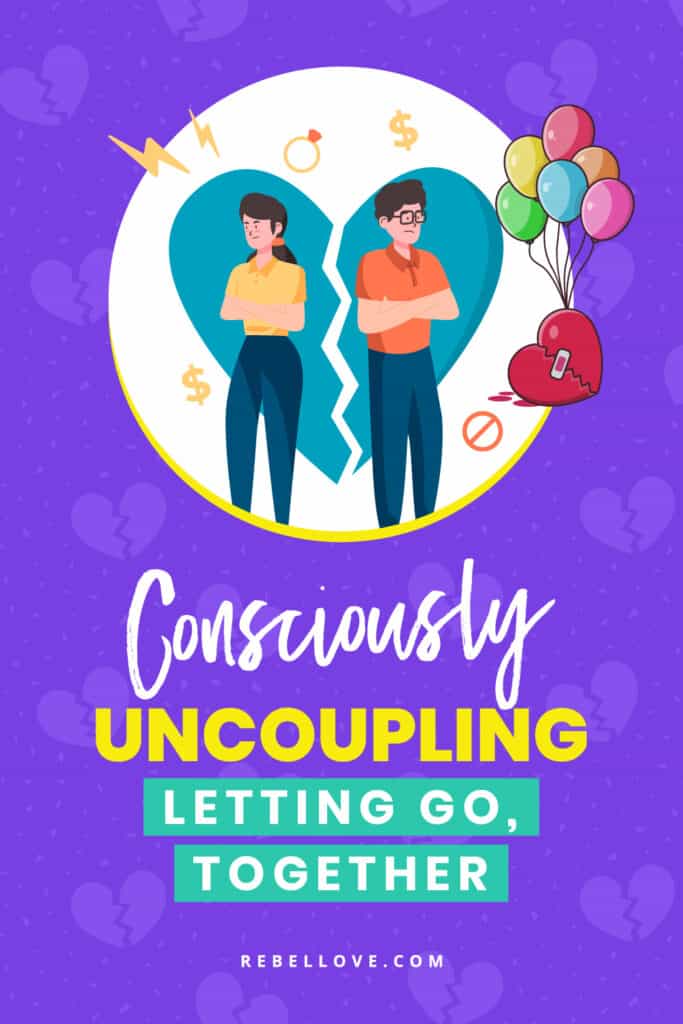This post may contain affiliate links and Rebel Love may be compensated for purchases visitors make through these links. We only promote products and services we really care about and that we think are useful. Read the full policy here.
Not all breakups are amicable. Let’s face it, towards the end of a relationship, emotions are high, the decision to separate isn’t always mutual, and the circumstances can be less than ideal (e.g., someone has an affair).
However, I doubt any of us go into relationships thinking, “this will never last”, or predicting some kind of tragic end. I like to believe we enter relationships with the hope for happiness and fulfillment.
Even so, sometimes the sturdiest, most intimate relationships can break down, and for many reasons. Does that make those relationships failures?
What is conscious uncoupling?

Conscious uncoupling has permeated break-up culture. It is a process whereby partners recognize their relationship has reached (if not surpassed) its expiration date. Conscious uncoupling requires awareness of the state of the relationship and taking a realistic look at the potentially destructive course it may take, should it continue.
Deciding to consciously uncouple means working together to let go of the relationship, each other, and the parts of your identities that are attached to one another. It allows the separation to be as painless as possible for all involved, with minimal collateral damage. It also empowers each person in reforming their identity independently.
Famous Conscious Uncouplers
Two of the most well-known conscious uncouplers are Gwyneth Paltrow and her ex-husband, Chris Martin. Editors at Goop, supported this concept with the following statement:
“For the vast majority of history, humans lived relatively short lives—and accordingly, they weren’t in relationships with the same person for 25 to 50 years. Modern society adheres to the concept that marriage should be lifelong; but when we’re living three lifetimes compared to early humans, perhaps we need to redefine the construct.”
This brings me back to the question: Does separation equate to a failed relationship?
I hope this quote brings comfort by showing that human beings are not “biolog[ically] and psycholog[ically] set up to be with one person for four, five, or six decades” (Goop). That isn’t to say it isn’t possible; however, many of us are under the impression that our partners should check every box and for the rest of our lives; however, some of our fundamental needs as human beings are growth and variety. Long-term relationships cannot always support those needs.
You don’t have to lose
Although Gwyneth Paltrow admitted the term conscious uncoupling “sounded a bit full of itself, painfully progressive and hard to swallow”, her goal was to separate with her husband without “losing everything”:
“I started to wonder, as impossible as it sounded, whether there was a way we could continue to feel the structure of our family on some level. Could we create a paradigm whereby we still ate meals together? Vacation, even? Could we find levity and laugh? But more than that, could my ex continue to be a family member, someone who would continue to protect me, want the best for me? Could I be that for him?” (Gwyneth Paltrow’s personal essay, Vogue)
And it worked!
Breakups as a Tool for Growth…?
Katherine Woodward Thomas, relationship expert and the woman who coined the term conscious uncoupling, confirms that:
“…your breakup can be healing, kind, loving and respectful for yourself and all involved.” (Conscious Uncoupling)
The conscious uncoupling process requires “the ability to understand that every irritation and argument within a relationship was a signal to look inside ourselves and identify a negative internal object that needed healing” (Goop).
From this perspective, we can take stock of our own emotional wounds. We can also recognize that our former partner is on their own healing journey as well. With this framework we can support (even from afar) one another’s emotional freedom and create better patterns for ourselves.
You Loved Your Partner Once

It’s also important to remember that you did love your partner once (perhaps you still do), and, as Gwyneth Paltrow so eloquently states:
“It’s OK to stay in love with the parts of your ex that you were always in love with. In fact, that’s what makes conscious uncoupling work. Love all of those wonderful parts of them. They still exist, they can still make you feel the way you felt for that person. Rather than shutting them out, lean into the unfamiliarity of those feelings and explore them. We lose all the nuance of life when we make it all bad or all good.” (Vogue)
There will be good days and bad days. Our relationships, especially long-term relationships, create a safety net for us. At the very least, they are a constant – something familiar and predictable. When they end, even in the best of circumstances, it can be jarring. The hope is that the lessons we’ve learned along the way (and continue to learn) can become a catalyst to forward movement. If we focus our sights on that and allow the separation to prepare us for a glorious, new future, this transition can bring us closer to ourselves, rather than feel as if we’re being torn away from someone else.
Why Choose to Consciously Uncouple
We’re living in a time where therapy is encouraged rather than stigmatized, emotional intelligence is highly valued, and rigid social structures (such as gender and monogamy) are being questioned. All of that to say, conscious uncoupling is possible and coincides with the enlightened direction in which the world is stepping.
There is an awakening of sorts, we can see this through the masses who are intentionally casting negative energy and negative emotions from their life to make space for healing and living happily. We can apply similar concepts to conscious uncoupling.
Neither an emotional wound nor an expired relationship has the power to seal your future. The elixir is the process of self-awareness and action steps. Regardless of your situation – whether you’re married and seeking a divorce, cohabitating or not, with children or childfree – conscious uncoupling is a commitment to the self, and a gracious gift to your former partner as they too work the process.
Here are the basic guidelines. Let these inspire you to integrate elements that are unique and required for your own conscious uncoupling.
1. Have the talk and then have it again
Communication isn’t everyone’s strong suit. Perhaps a breakdown in communication was a part of your relationship’s problem…
Don’t fret. Communication during the process of conscious uncoupling simply means making the separation official, in the sense that, all parties are committed to the agreed upon procedure of ending the relationship.
Communication in this capacity also means setting parameters that are conducive to a healthy breakup. This includes setting boundaries. These can take different forms depending on the context of the relationship:
🖤 Do you live together?
🖤 Are children involved?

🖤 Do you share any other form of responsibilities, such as financial ties, other dependencies, etc.
The point is to create a game plan together on how each area will be tackled.
🖤 What do each of you want the future to look like?
🖤 What does emotional freedom look like to you both, independently?
🖤 Will you remain friends?
Relationships that still hold highly romantic tensions or feelings of attachment may require distance for longer periods of time (if not forever) post-breakup.
Maybe you’ve been cohabitating for years without intimacy, communication, or attraction, and therefore do not require as much time to process feelings of emotional attachment. This is for you to reflect on, and construct boundaries that safeguard your own emotional states.
Remember the Goal
Remember, this process is not to find blame or pinpoint where things went wrong. This purpose of conscious uncoupling is quite the opposite. You want the separation to provide as much closure and view the relationship not with a status of incompletion, but rather that it’s completed itself, and therefore requires you to move on.
Pay attention to how you feel throughout this process, communicate your needs when it involves your partner or your shared responsibilities, and make the proper adjustments accordingly. As you both exit the relationship, your needs don’t need to be symmetrical, in fact, honoring yourself separately from your partner will begin the process of detachment and identity reformation.
There is no first-and-last conversation during the process of consciously uncoupling. Depending on the level of your shared responsibilities, speaking regularly may be a necessity until the separation is finalized (and thereafter). Which brings me to…
2. Seek professional guidance if/when needed
With any transition in life, we are bound to come up against obstacles. My advice is to seek out a professional in this space – be it a relationship counsellor or coach.
A professional in this space can help you navigate the separation itself, communication, and even address trauma or emotional distress. Even if you don’t require their constant guidance, having an expert on-call can alleviate concerns throughout the process.
3. Respect the parameters
Now that you’ve communicated, sought out a professional, it is time you keep your word.
Respecting the parameters until the separation is complete ensures all parties can exit without further emotional disruption. It is important, however, to note that you and your former partner are responsible for your own emotions and journey of healing. This is a separation, not an attempt to rekindle sparks or maintain your position in each other’s lives.
Stay honest with yourself and be realistic about the process. You are both taking on new roles, which will (eventually) include resigning from your duties as a partner.
4. Sort your side of the road

The purpose of conscious uncoupling is to close the final curtain on your marriage or relationship, and to do so with a strategy to heal.
For the best results, you have to take responsibility for your path forward, and even self-reflect on the previous relationship. Again, this isn’t to find fault with anyone (yourself included), but rather to take stock of your emotional wounds and unhealthy patterns. When we do this successfully, we become less of a stranger to ourselves; the path forward becomes clearer as we establish where we can do things differently – where we can begin to amend and serve ourselves.
5. This is the part where you break up
So, the action of finality has come. What does it look like for you? How does it feel? Take a breath in and know that this is the beginning of a new chapter, heck, a new book!
What you and your former partner had is in your beautiful past, and you can step into this new future, prioritizing you and the relationships you decide to nourish. The conscious uncoupling process is about moving forward, moving into the self, understanding your former partner is doing the same… And being grateful for the completion of that relationship and the lessons learned there.
Until next time,
Take care, friends.
Quean Mo xx